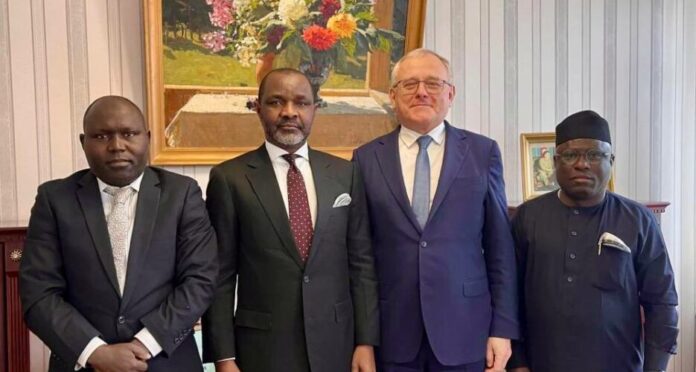In a dramatic announcement that is sure to send ripples through the global diplomatic community, Nigeria has revealed its decision to reopen its embassy in North Korea.
Patrick Imodu Imologome, Nigeria’s Interim Commissioner for Affairs (Chargé D’affaires) in North Korea, made the revelation during a protocol visit to the Russian Ambassador, A. Mategore, in Pyongyang, the North Korean capital.
The meeting, which was disclosed by the Russian Embassy in North Korea via a Facebook post, signals a major diplomatic development. It was the first time in several years that Nigerian officials made such a high-level engagement with North Korea.
Nigeria’s diplomatic ties with North Korea were put on hold in 2021 following the United Nations’ sanctions on the hiring of North Korean expatriates. The UN imposed the ban as a response to North Korea’s controversial development of nuclear weapons and missile programs, which have raised tensions across the globe.
Despite this, Nigeria had maintained a relatively cordial relationship with North Korea. In fact, the West African nation sought North Korea’s support during the COVID-19 pandemic in 2020. As part of this collaboration, medical professionals were flown into Nigeria to help with the country’s pandemic response.
However, things took a sharp turn in 2021 when a health professional raised concerns about Nigeria’s disregard for the UN sanctions on North Korean labor. The United Nations became aware of this violation, which led to a freeze in diplomatic relations between the two countries.
The reopening of the Nigerian Embassy in Pyongyang now positions Nigeria as the second African country, after Egypt, to maintain a diplomatic presence in North Korea. This move is expected to alter the dynamics of Africa’s role in global geopolitics and further deepen ties between the two nations.
“The reopening of our embassy in North Korea is an important step toward strengthening Nigeria’s diplomatic presence in Asia and reaffirming our commitment to maintaining meaningful international relations,” said Imologome during the visit to the Russian Embassy.
Imologome’s statement highlights the broader significance of the diplomatic shift. While the world continues to view North Korea with skepticism, particularly due to its nuclear ambitions, Nigeria appears determined to chart its own course in fostering relations with the reclusive nation.
This bold move comes at a time when many countries are reevaluating their foreign policy strategies in the face of global tensions. The recent decision underscores Nigeria’s desire to navigate the shifting geopolitical landscape with a focus on what it sees as the best interests of its people.
For Nigeria, the return to North Korea holds more than just symbolic importance. The reopening of the embassy will allow for a greater exchange of knowledge, trade, and diplomatic dialogue with a nation that has long remained isolated from much of the international community.
Political analysts suggest that Nigeria’s engagement with North Korea could also have economic implications. North Korea is known to have a large pool of labor resources, which could present opportunities for cooperation in areas such as infrastructure development and industrial growth.
Some critics, however, have raised concerns over the risks of rekindling relations with a country that is under heavy international sanctions due to its nuclear program. Many argue that this move could damage Nigeria’s standing within the international community, particularly in relation to countries that are firmly opposed to North Korea’s missile and nuclear activities.
In response, Imologome emphasized that Nigeria’s diplomatic strategy was based on national interests and mutual respect. “Our foreign policy is guided by the need to protect and advance the interests of Nigeria and its people. We believe that engaging with North Korea offers opportunities for further cooperation in areas such as education, trade, and public health.”

